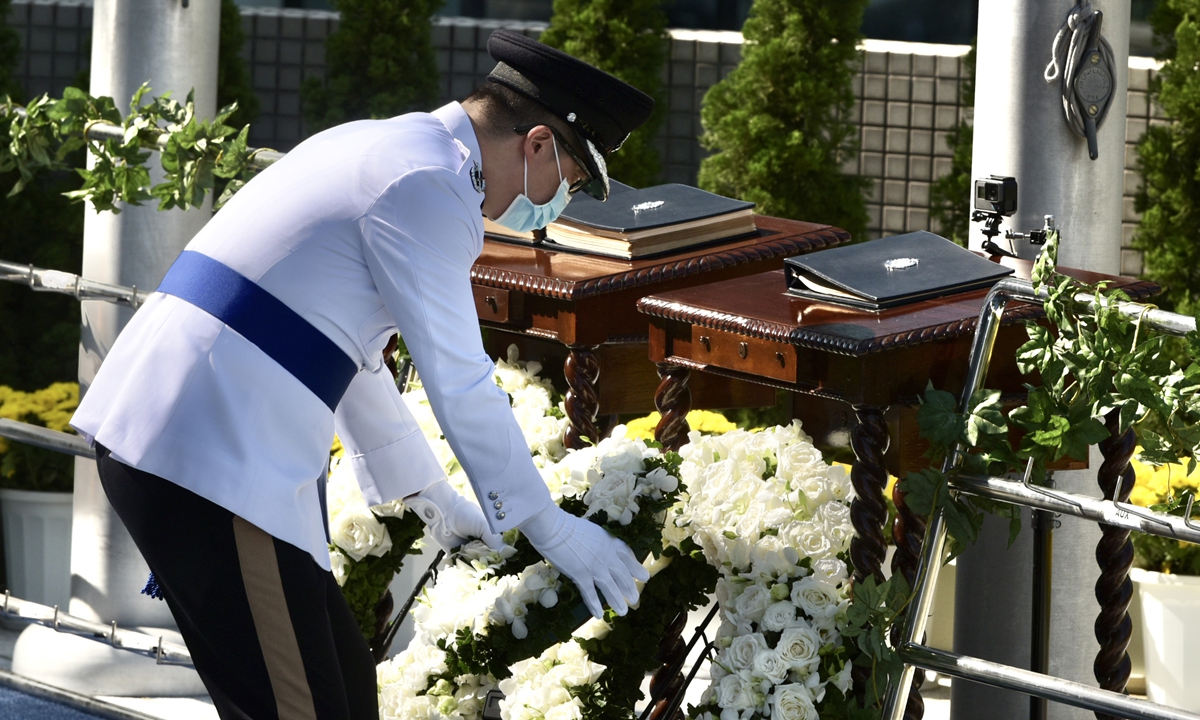Central govt deepens trust in Lam
Source: Global Times Published: 2020/11/6 10:54:46 Last Updated: 2020/11/6 21:25:46
Overall governance over HK ensures city’s long-term prosperity

Hong Kong: VCG
The central government's trust in the Hong Kong government led by Chief Executive Carrie Lam has deepened from maintaining social stability to economic development and long-term prosperity in the past year, Chinese analysts said, after Lam's Beijing visit this week, during which she communicated with several ministries, and also had a meeting with Chinese Vice Premier Han Zheng.
The deepened trust came after Hong Kong successfully implemented the national security law for Hong Kong under the central government's guidance, and the release of the 14th Five-Year Plan (2021-25) which highlighted the overall governance of the central government over special administrative regions.
The central government fully recognizes that Lam led Hong Kong to overcome various difficulties this year, including controlling the COVID-19 epidemic, reviving the economy, implementing the national security law for Hong Kong and maintaining overall stability. Her efforts have yielded remarkable results, Han said Friday while meeting Lam in Beijing.
Han said he found that there was some good news about Lam's communication with various ministries during her Beijing visit, and the central government and other government departments will give their full support to anything that contributes to Hong Kong's long-term prosperity and stability, improves the livelihood of the Hong Kong people, and helps Hong Kong integrate into the overall development of the country and the Guangdong-Hong Kong-Macao Greater Bay Area.
He hopes that Hong Kong could grasp the opportunities from the overall development of the country in the 14th Five-Year Plan period and find a better position to develop Hong Kong even better.
Lam expressed deep appreciation for the central government's support of Hong Kong.
Senior officials from the Hong Kong and Macao Affairs Office of the State Council and the liaison office of the central government in Hong Kong also joined the meeting.
Lam is on a three-day visit to Beijing, and she will leave for Guangzhou on Friday evening to meet leaders of Guangdong Province, before visiting Shenzhen the next day to discuss how to move forward with the Guangdong-Hong Kong-Macao Greater Bay Area development and Hong Kong-Shenzhen cooperation.
Almost a year ago, Han, who is also the head of the Central Coordination Group for Hong Kong and Macao Affairs, met Lam in Beijing for the first time in five months after social unrest began in June 2019. Last year's meeting came amid festering social unrest that saw rioters vandalize shops, set fire to public transportation, attack ordinary residents and police officers, and rumors that Beijing had plans to replace Lam.
Han said in last year's meeting with Lam that the central government fully acknowledged and supported the work of the Hong Kong government and police force. Stopping violence, curbing chaos and restoring order were the most important tasks for Hong Kong, Han said.

Hong Kong Commissioner of Police Tang Ping-keung pays tribute to fallen officers at the Force Remembrance Day on Friday. Tang said they have faced down protracted violent protests and must prevent a resurgence of the violence. Photo: cnsphoto
A major difference between the meeting last year and this year was that Hong Kong's main target has turned from maintaining stability to promoting economic development, Tian Feilong, a Hong Kong affairs expert at Beihang University in Beijing, told the Global Times.In addition to firm support, Beijing has given high recognition to Lam this year.
The central government highlighted its support in maintaining Hong Kong's stability last year, but this year it extended its support to Hong Kong's economic development and long-term prosperity, which showed the central government's deepened trust in Lam and the Hong Kong government, Tang Fei, a member of the Chinese Association of Hong Kong and Macao Studies, told the Global Times.
Hong Kong's economy has been greatly rattled by social unrest, in addition to the pandemic and US sanctions over the national security law for Hong Kong. But its driving force is to be integrated into the overall national strategy, showing a clear path for the central government to lead Hong Kong under the "one country, two systems" principle, Tian said.
For Hong Kong, the key to seizing the new round of development opportunities lies in quickly repairing its internal cracks and reaching a consensus among society in strongly participating in the development of the country, Tian said.
Over the past year, the Hong Kong government not only maintained social stability but also improved its sensitivity in overall governance of the central government over Hong Kong, Tang said.
Previously, Hong Kong government officials did not keep it in their mind to make policies, which resulted in the deviation of some policies that somehow allowed activities that undermined the principle of "one country, two systems," according to Tang.
In the future development, Hong Kong government will better maintain sensitivity in evaluating and making policies to prevent any actions that might estrange Hong Kong from the governance of the central government and move towards local extremism or secessionism, Tang said.
The 14th Five-Year Plan highlights the overall governance of the central government over the special administrative regions, stressing the implementation of the law and enforcement mechanism on safeguarding national security. China should resolutely guard against and contain outside interference in Hong Kong and Macao affairs, reads the new plan.
Analysts believe the Hong Kong government, which attaches more importance to the overall governance of the central government, will ensure the city's development in the long term.
Posted in: POLITICS,HK/MACAO/TAIWAN